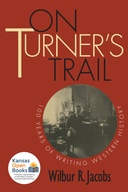Explore

Should Frederick Jackson Turner be revered as “the father of western history” or reviled as a misguided advocate of a frontier spirit and rugged individualism that denied cultural diversity and produced widespread environmental destruction? Dividing into campus over the issue, western historians place him everywhere from one end of the spectrum to the other.In this provocative new interpretation of Turner’s life, work, and legacy, Wilbur Jacobs challenges the views of traditionalists and views of traditionalists and revisionists alike. From extensive research in the Turner archives, a nationwide search for additional Turner correspondence, interviews with historians, and a lifetime of collecting Turner anecdotes, Jacobs chronicles Turner’s professional (and sometimes personal) bequest through 100 years of Western historical writing.Jacobs adds his voice to the heated debate by mixing a sophisticated critique of historical writing with stories of professional intrigue—the fights to protect Turner’s legacy, limit access to the Turner archives, and control the Western history Association. He traces the intellectual development of Turner’s frontier theory; explores the intense rivalry between two major Turnerian disciples, Frederick Merk and Ray A. Billington, as they vied for control of Turner’s legacy; and analyzes the efforts of new western historians who seek to erase Turner and Billington from the landscape of what is now called the history of the “West.”Balanced in his assessments, Jacobs treats Turner and his disciples with a sympathetic yet critical eye. He points out Turner’s limitations in dealing with environmental, racialethnic, and urban themes as well as the shortcomings of Merk, Billington, and other Turnerians. At the same time, however, Jacobs illuminates the major contributions of their work.Despite their intense differences, Jacobs argues, all western historians remain inextricably linked by Turner’s legacy.
This book is included in DOAB.
Why read this book? Have your say.
You must be logged in to comment.
